Link light rail construction connecting Seattle to the Eastside will impact thousands
SEATTLE – Sound Transit announced Thursday that Link light rail service will be reduced from Jan. 4 to March 15 to build new tracks as part of the Connect 2020 project
Construction will link existing tunnels to 10 new stations in east King County by the year 2023. Instead of shutting down service completely during construction, Sound Transit is going to keep trains running. However, directors are alerting thousands of riders that the project is going to cost them a longer wait and less space for the next 10 weeks.
Ron Lewis, Sound Transit executive director of design, said Connect 2020 is part of a bigger project to expand light rail service throughout the region—growing the system from 22 miles to 116 miles in the coming two decades.
Starting Saturday, Sound Transit crews will close one link track at a time in downtown Seattle through March. Four-car trains will operate on a single track in both northbound and southbound directions. Lewis explained this will free up the other track for crews to have safe access to connect tracks through the eastside.
When completed, Connect 2020 will add 14 miles of new service in the area. Several people who ride the Link light rail said they support the project as the Seattle region continues to grow.

“More travel is good. There’s a lot of people that need public transportation,” said Chris Worthen, who uses the system to commute to work.
Sound Transit said thousands of passengers will be impacted by the construction. They estimate wait times will increase from six minutes to 12 minutes. Directors also anticipate stations, platforms and trains will be more crowded.
“All of us will be inconvenienced in some way. But ultimately 10 weeks of mild discomfort is something I think we can all tolerate for what will hopefully hundreds of years and multiple generations of payoff,” said Aaron Parker, who uses the light rail system for most of his transportation.
Saturday also begins one of three full weekend closures (Jan. 4-5, Feb. 8-9 and Mar. 14-15) of light rail service at these seven stations:
• SODO
• Stadium
• International District/Chinatown
• Pioneer Square
• University Street
• Westlake
• Capitol Hill

Saturday, Jan. 4 begins one of three full weekend closures of light rail service at these seven stations
To make up for the inconvenience during those three full weekend closures, King County Metro Transit will provide free metro shuttle buses to replace light rail service at downtown stations.
“We do expect that many of our stops and stations will have overcrowding. And we’re going to be working with our partners to understand if there’s more services we should be adding during this time period,” said Chris O’Claire, King County Metro Transit’s mobility division director.
People traveling through downtown will have to get off their train at Pioneer Sqaure and use a new center platform to transfer to another train.
“We recognize the inconvenience of transferring from one train to another which is why we built the center platform to make it as easy, quick and safe as possible as we maximize the number of people we can carry and avoid the need for greater service impacts,” said Lewis.
Bicycles won’t be allowed at Pioneer Square Station for safety reasons. Sound Transit is installing new on-demand BikeLink lockers at Rainier Beach, SODO, and University of Washington stations.
“I’m more likely to leave my bike in my bike locker at Columbia City Station and just ride without my bike up here,” said Parker.
Some riders said they will be depending on Sound Transit’s communication to help find their way through the temporary changes.
“If people are aware of what the wait times are and when the buses are going to come and when light rails are going to come then I think it’s going to be easier for people to go manage that expectation,” said Worthen.
Sound Transit will be posting signs and staff will be located throughout the stations and trains to help people navigate through the construction. Some passengers believe it will be a short-term inconvenience with long-term gains to help the region get with the times.
“Seattle is way behind a lot of cities on this,” said Parker. “I think it’s worth whatever it takes for us to have a functioning mass transit system that can bring us into the future.”
Sound Transit is inviting passengers to subscribe to its email or text alerts for the latest information on Connect 2020. King County Metro Transit is also offering a trip planner to help people coordinate travels.
Seattle Department of Transportation is also a partner in Connect 2020.

